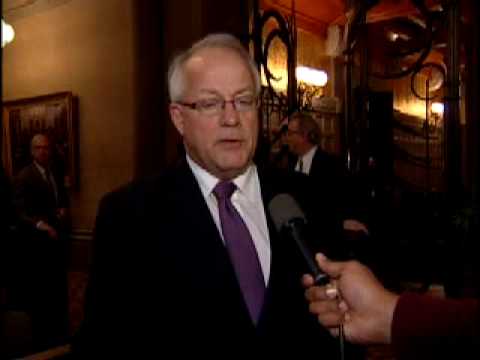
Senator Dale M. Volker Announces Senate Passage Of Two Budget Reform Measures
(Albany, NY) Senator Dale M. Volker (R-I-C, Depew) today announced that the New York State Senate today passed two comprehensive budget reform bills that would fix the budget process and put an end to late budgets beginning this year with the enactment of a contingency budget in the event a new budget is not enacted by April 1.
"The State Senate is again taking a proactive role in bringing about real reform to end late state budgets and ensure that those entities who depend on state programmatic and financial support have consistency as they adopt their own budgets," said Senator Volker. "With the recent Court of Appeals decision that excludes elected members of the legislature from participating in the state budget process, this legislation is needed more than ever to ensure that our system of checks and balances remains intact to protect our citizens and state."
"The Senate will act on the same budget reform measure that we passed last month, and the Governor agreed to sign, that would put budget reform in place now. In addition, we will act on legislation that passed both houses and was vetoed by the Governor, that would implement a constitutional amendment we intend to put before voters this fall," Senator Bruno said. "I urge the Speaker to bring both bills before the Assembly for action as soon as possible, or, act on a different bill and reconvene the Budget Reform Conference Committee to work out an agreement that can be sent to the Governor right away."
The Senate will act today on a budget reform bill (S.2), passed by both houses last year, that would:
Provide more time for budget negotiations by requiring an earlier submission of the Executive Budget;
Change the start of the state fiscal year (SFY) from April 1st to May 1st, beginning in SFY 2006-7;
Provide for greater detail and more disclosure in the budget;
Put a contingency budget into effect automatically if a new budget is not adopted by the May 1 deadline; The contingency budget would continue the previous fiscal year budget forward until it is changed by the Legislature; and
Require a two year appropriation for state school aid.
The Senate will also act on a budget reform bill (S.3), originally passed by the Senate last month, that would take effect immediately and change the budget process this year. The Governor has said he would sign this bill into law, if passed by both houses. The bill includes many of the same provisions as the other bill (S.2), including the May 1st fiscal year date and the two-year school aid appropriation. The primary differences of this bill are:
It would take effect in time to reform the budget process in 2005, instead of 2006;
The Governor would submit a contingency budget by February 1st which would have to be adopted by the Legislature prior to the beginning of the fiscal year. Legislation related to the preceding fiscal year’s budget would remain in effect during the contingency period;
It would create the Independent Financial Review Board to determine whether receipts would be sufficient to meet spending requirements. If the Board determines that receipts would be insufficient to meet spending requirements authorized by the Contingency Budget, uniform reductions would automatically be made to all spending items, except those which are exempt from spending limits, no later than 15 days after the beginning of the fiscal year. The five member board would be comprised of one appointment each from the Senate Majority and Minority leaders, the Assembly Speaker and Minority leader and Chairman to be nominated by the Governor and approved by both houses;
Also, the bill would end the contingency budget period upon passage of a single multiple appropriation bill amending the Contingency Budget, submitted by the Governor within 15 days of the start of the contingency period. The Governor’s submission may propose reductions to appropriations in the Contingency Budget and propose additions to the Contingency Budget which reflect policy initiatives.
In addition, the Senate has introduced a resolution (S.1) for second passage of a budget reform constitutional amendment that accompanies one of the bills (S.2) being acted on today.
####
